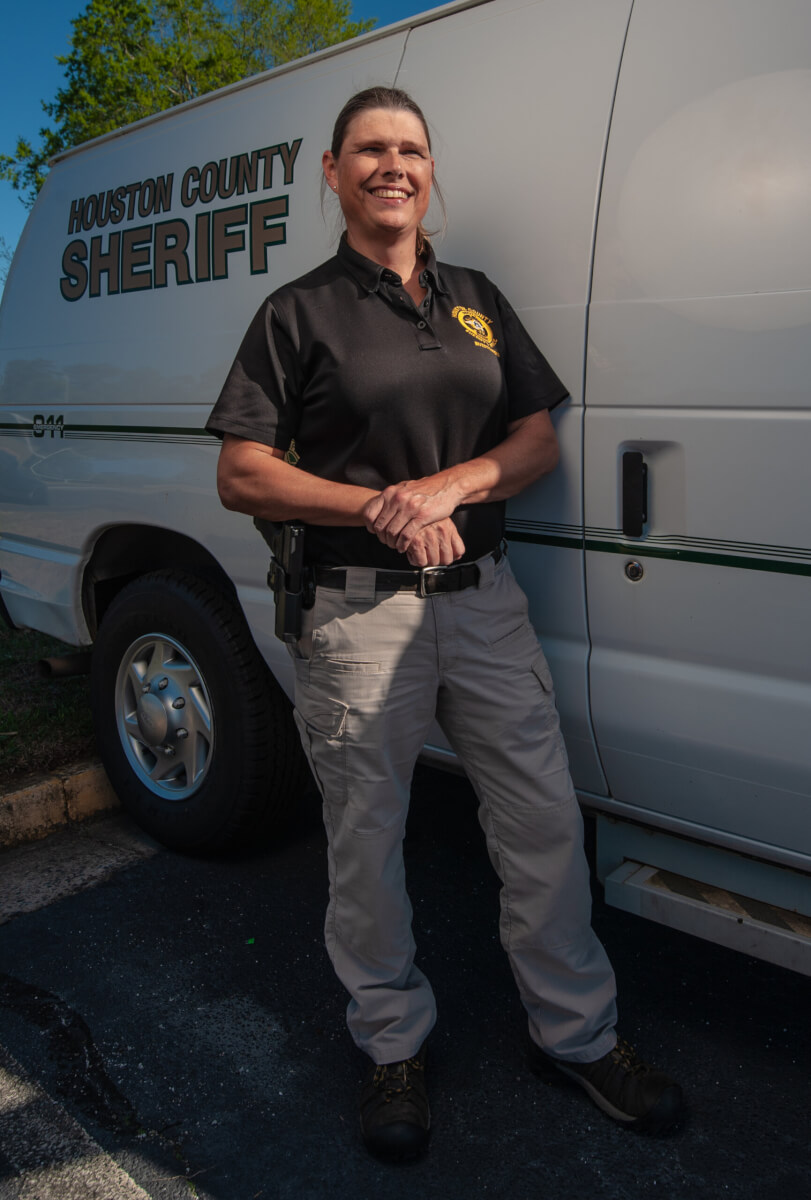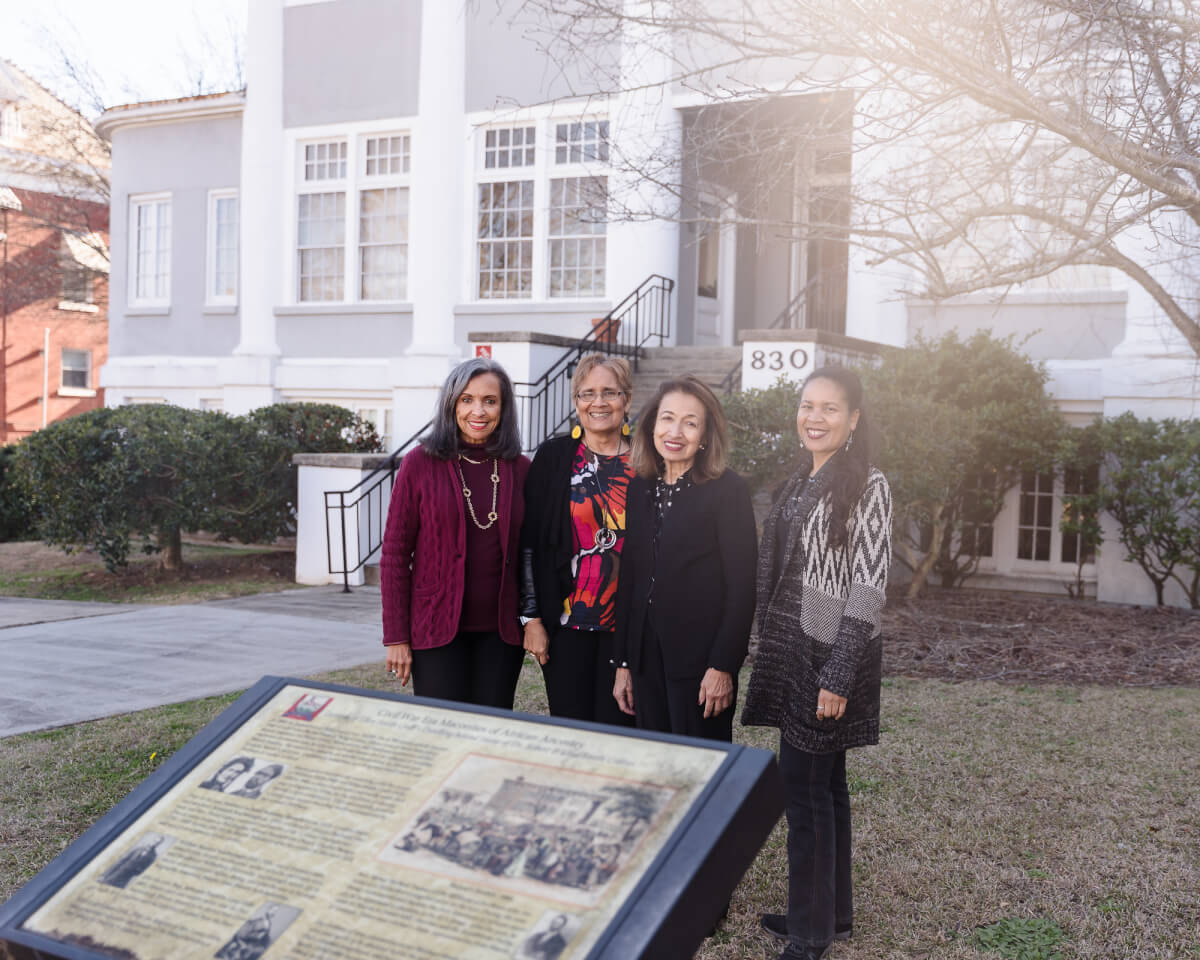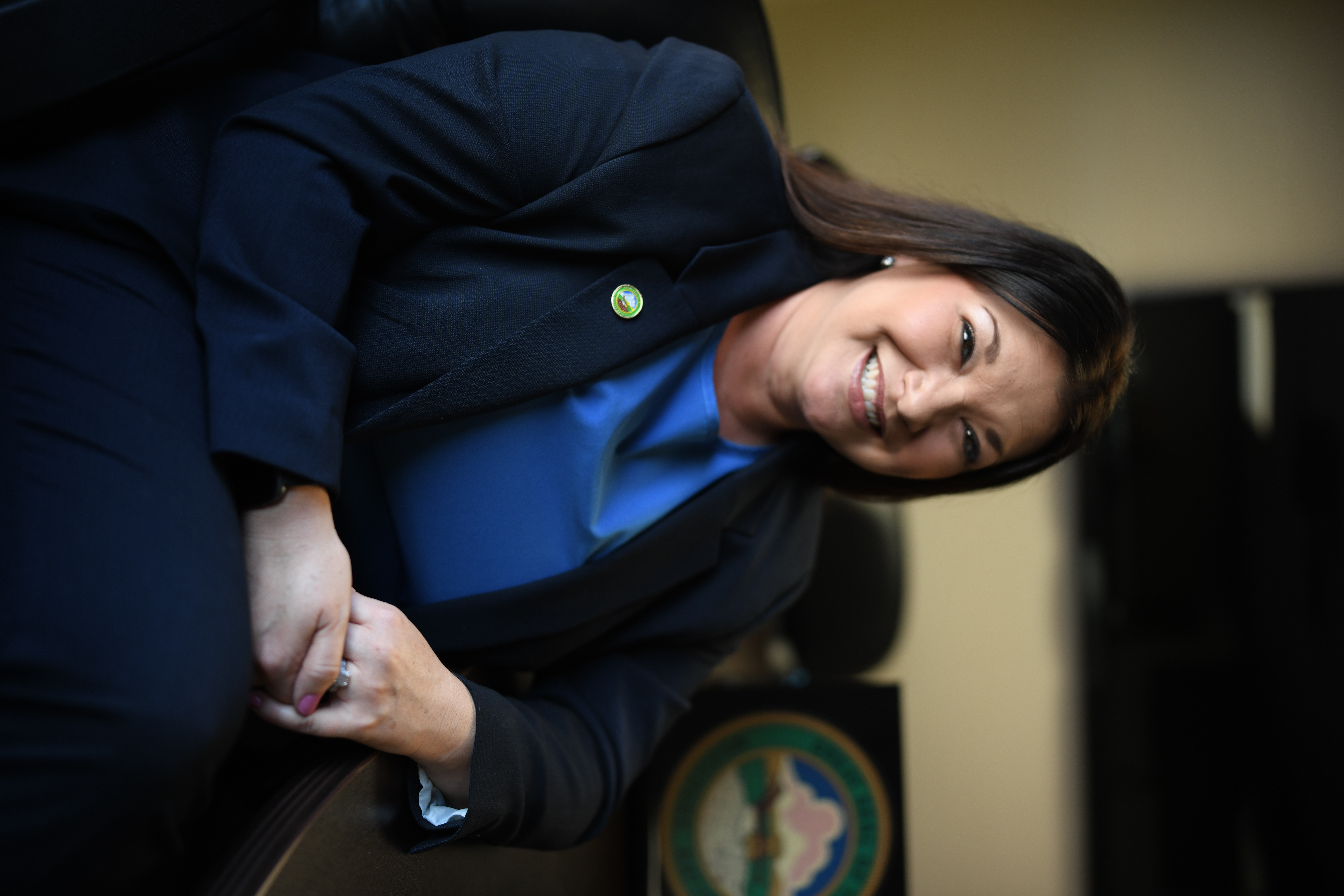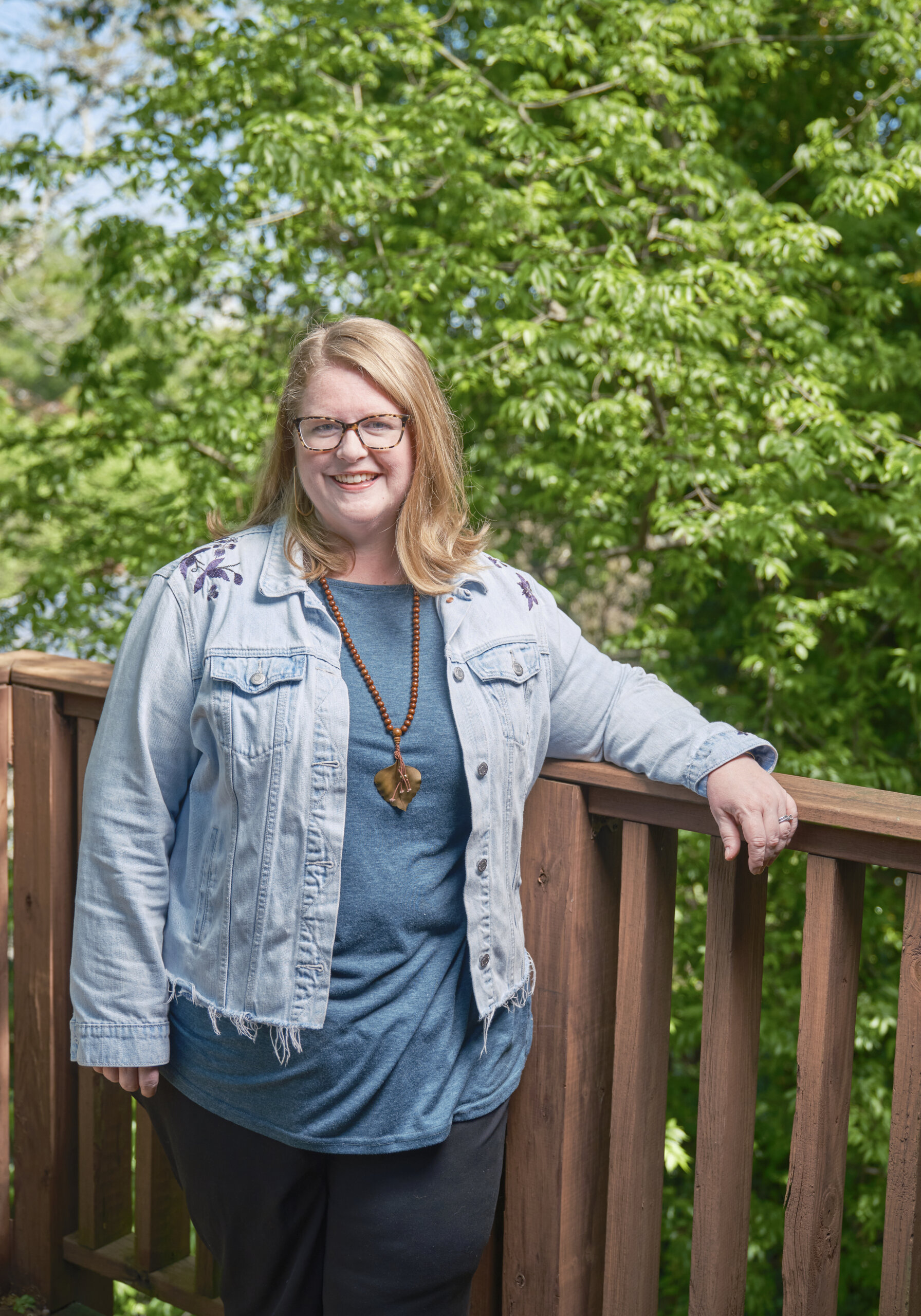
This sergeant knows she can do it
Sergeant Anna Lange’s journey has taken her from a long career behind the scenes in public service to becoming one of the major faces fighting for LGBTQ+ rights in the South. Her case illustrates how gaps in equity for women and gender minorities impact life and work.
By Julia Morrison
Photography by Dsto Moore
Anna Lange has been a deputy with the Houston County Sheriff’s Department for over 15 years, but she resists the tough stereotypes of law enforcement officers. During her interview, she was picking up a new puppy to bring home. She said the best part of her job as a sergeant, in which she is often investigating financial abuse against elders and vulnerable citizens, is assisting people without a voice who are unable to help themselves.
A LOCAL FIGHT ENTERS A NATIONWIDE FIRESTORM
And in her journey becoming an icon for LGBTQ+ workplace rights on a national stage, she’s not afraid to admit vulnerability: “It terrifies you, being who you’re meant to be.”
From right here in Central Georgia, Lange represents the firestorm that has swirled nationally around gender, sexuality, and gender identity, one that has particularly affected transgender people. For several years, Lange has been engaged in a lawsuit against Houston County to cover the cost of her gender affirmation surgery, one that the county has spent almost $1.2 million dollars in legal fees to fight through the end of 2022, according to ProPublica.
This figure is more than the entire yearly healthcare budget for all Houston County employees. Adding healthcare coverage for gender affirmation on their plan would have cost the county an estimated $10,000 per year and was recommended by the insurer, while Lange’s specific surgery would have likely cost $25,000.
Houston County citizen and Mercer University law student Julian Santos was struck by the cost the county was willing to pay to fight this multi-year lawsuit at a March 2023 Board of Commissioners meeting, stating, “To put this number in perspective, Sergeant Lange’s surgery … could have been paid more than 50 times.”
In 2022, the Human Rights Commission observed that 315 anti-LGBTQ+ laws were introduced in statehouses around the country and 29 were signed into law, the worst year ever for this form of legislation in American history. 24 bills in states that enacted protections for gender identity and sexuality were passed last year, representing the polarized climate on this issue.
Georgia is no exception, with five anti-LGBTQ+ bills currently advancing in the state legislature in 2023. Simultaneously, some of the biggest victories protecting gender identity and sexuality in the workplace have come from Georgia’s justice system. In the 2020 decision Bostock v. Clayton County, the United States Supreme Court affirmed in a 6 – 3 ruling that discrimination against gay or transgender employees was considered sex discrimination, prohibited by the Civil Rights Act.
Protecting the plaintiff, who worked for the Juvenile Court of Clayton County, Neil Gorsuch clearly stated in the majority opinion, “An employer who fires an individual merely for being gay or transgender defies the law.”
PURSUING PUBLIC SERVICE – AND BECOMING ONE’S TRUE SELF
This decision would come to echo on Lange, who made the decision to come out in 2017. Her calling to pursue policing came first from a desire to help animals. After considering that her dyslexia might prohibit a veterinary career while at Auburn University, she decided that being a game warden would be a better path and studied law enforcement.
After working patrol in both Columbus and Houston County, Lange moved up the ranks to investigations and then sergeant. She said she enjoys public service: “It’s certainly a rewarding feeling. You’re not going to make a lot of money, but most people aren’t doing it for the money.”
Lange said she didn’t grow up around any LGBTQ+ people, which informed the time before coming out and undergoing gender affirmation. “Gender dysphoria had bothered me my whole life, but I didn’t know what it was or how to go about it,” she said. But during the process of coming out, Lange grew: “Over those two years, I learned to not only be proud of myself — because coming out is so scary — but because I was confident in myself. You realize all the things you take for granted.”
Like many forms of care for women and gender minorities in the workplace, private insurance policies can be opaque in the patchwork of services they cover. Lange called her insurer and was told gender affirmation surgery could be covered. She also had her surgeon’s office call to confirm coverage. With these assurances in mind, in 2018 Lange booked a plane ticket to New York and had a surgery consultation with a date set for the operation. Not long after, she got a letter saying insurance coverage for her surgery was denied.
The denial was due to an exclusion in Lange’s Anthem health plan for gender affirming care, an exclusion the provider had encouraged Houston County to remove in 2016 as part of their nondiscrimination mandate. The county commissioners voted to maintain the exclusion in November 2019, following a meeting wherein Lange explained her situation.
After consulting with a transgender legal defense and education fund, Lange said she believed she had been discriminated against, and the process began in federal court. A June 2022 order made in the U.S. Middle District of Georgia by Macon’s Judge Marc Treadwell allowed Lange’s case to proceed to a civil trial in a ruling believed to be the first of its kind in the South, according to Lange’s attorney David Brown
By the time of oral argument, Bostock v. Clayton County had been decided by the Supreme Court, cementing that discrimination against transgender employees was illegal sex discrimination. This was a major factor in Judge Treadwell’s ruling, in which he flatly stated: “Ignoring Bostock doesn’t make it go away.” In granting Lange’s claim, he added, “The exclusion plainly discriminates because of transgender status.”
Though this meant more time in court to come, Lange said she is heartened by the result of the ruling. “I felt vindicated because all along, I knew I was in the right. I knew that county officials had chosen not to cover this for a valid reason,” she said.
A jury of her peers agreed at Lange’s civil trial, awarding her $60,000 in damages. Currently, Houston County and Sheriff Cullen Taton are appealing the ruling.
Outside of her case, Lange said she feels like she is making a difference for other women and gender minorities to speak up in the workplace for their rights. “People say, ‘If she can do it, I can do it.’ There’s safety in numbers. Being out and open certainly helps people say, you know, it’s going to be okay.” As news media around the country has grown around her case, she has been contacted by others who are struggling with gender identity, including parents trying to navigate a path for their children.
WHAT PUBLIC COMMENT REVEALS ABOUT THIS CASE
Houston County has chosen not to comment to the public or to the media about the ongoing litigation or choosing to maintain the exclusion on gender affirming care, including at last month’s heated commission meeting where public comment boiled over after the over $1 million dollar legal tab was revealed.
The community encouraged the commissioners to reconsider, with more than five individuals defending Lange. “As a taxpayer, why must I contribute to the county to support the county in denying Sergeant Lange coverage for her surgery?” Santos argued. “There’s no logical explanation I can find other than blatant discrimination.”
Reverend Amanda Schuber, a minister of High Street Unitarian Universalist Church in Macon, described herself as a fairly new Houston County resident and said her pronouns were “anything spoken in love.”
She remarked that Lange’s case was “the misappropriation of over a million dollars and the refusal to support one of our brave officers.” Schuber called gender affirming care “life-affirming care” continuing to say to the commission, “your opinions and feelings on the necessity of this care are not relevant.”
Schuber finished by asking the commission to “prioritize the worth of all individuals.”
Two individuals spoke in favor of the county maintaining the healthcare exclusion and said they felt their money was well spent. Resident Jacqueline Rozier said, “They make a choice, then they pay the cost,” while Warner Robins resident Daryl Allen quoted the Bible and said that he felt women should not be ministers, a comment that elicited murmurs from the crowd.
Another development in March was an amicus brief filed supporting Lange from the U.S. Department of Justice’s Civil Rights Division, authored by Assistant Attorney General Kristen Clarke, which stated, “The United States has a substantial interest in this appeal” and upholds the findings of the district court as correct.
“I’M JUST GOING TO WORRY ABOUT THE JOB I CAN DO.”
While Lange described this experience as exhausting and stressful, she still encourages women and LGBTQ+ people to consider law enforcement as a career. “There’s a ton of great female officers in Houston County and Warner Robins, Perry. Patrol, everywhere. There was a stigma when I first started that women weren’t wanted … Nowadays, with the way law enforcement has evolved, that kind of stuff isn’t tolerated anymore.”
She does notice how women tend to get dismissed more often when speaking in the workplace. “Speaking with a lot of my female coworkers, it is like, welcome to womanhood! Even though I’ve been doing this for 25 years and know the job really well,” Lange explained.
But she said she believes her work is worth it and that the field is opening doors for women and LGBTQ+ officers. She encourages other women and gender minorities to focus on their mission: “You have to say, ‘I’m just going to worry about the job I can do.’”
As the fight around the country continues around transgender rights, Lange seeks more dialogue and more patience. According to U.S. Census data, five percent of Georgia’s workforce identifies as LGBTQ+, so this issue isn’t going to disappear. “It’s got to come with individuals who are willing to listen and understand what gender dysphoria really is,” she said. “I deserve equal healthcare to what my coworkers receive.”







